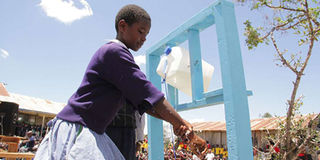Kitui County celebrates sanitation milestone

A Mureru Primary School, Nyeri, pupil marks the Global Handwashing Day on October 15, 2013. PHOTO | FILE | NATION MEDIA GROUP
What you need to know:
- The germs in human faeces can cause diseases including cholera, hepatitis, polio, and worm infections.
- Sustainable Development Goal 6.2 challenges countries to achieve access to adequate and equitable sanitation and hygiene for all to end open defecation.
Children are immersed in a competitive game of hide and seek, others ride their bikes at a playground near their homes.
The clamour in their voices is strong and the enjoyment palpable. Play is healthy. Bahati takes a quick bathroom break, runs home and, in less than a minute, is back, a mango in hand to rejoin the game. His mother calls him out from the doorstep.
“You need to wash your hands, Bahati,” she calls in earnest as the seven-year-old rushes back to the house to execute the request.
Handwashing with soap is among the most effective and inexpensive ways to prevent infectious diseases.
The germs in human faeces can cause diseases including cholera, hepatitis, polio, and worm infections.
PRACTICE
Handwashing with soap under running water is a simple behaviour that can save lives.
It can cut deaths associated with diarrhoea by almost half and deaths from acute respiratory infections by nearly a quarter. Appropriate handwashing also allows children to learn, grow healthy and strengthen communities.
The knowledge about handwashing and its importance is high in Kenya. However, the actual practice remains a challenge.
A 2015 Kenyan household survey found that only 14 percent of the population had handwashing facilities on premises with soap and water.
On October 15, we celebrate Global Handwashing Day. And this year Kitui County is also celebrating a remarkable sanitation milestone — being declared Open Defecation Free (ODF).
This means that every household in Kitui has a latrine and handwashing facility with water and soap present. The county has now doubled the protection against preventable diseases and deaths.
SANITATION
Sustainable Development Goal 6.2 challenges countries to achieve access to adequate and equitable sanitation and hygiene for all to end open defecation.
Under this vision, Kenya rolled out the ODF Campaign in 2011 with the aim of making Kenya 100 percent ODF by 2020.
Kitui heeded the call and began the journey in 2014. At that time, only 13 percent of villages were certified as ODF as the county bore the brunt of recurrent cholera outbreaks and other preventable diseases due to poor water, sanitation and hygiene practices.
Decisive action was taken and for the next three years through the “Pamoja Tujikinge Mangojwa (Together let us protect ourselves from illnesses) Integrated Programme”, the Kitui County Government allocated Sh75.6 million to support the Community Led Total Sanitation initiative, an innovative way of mobilising communities to completely eliminate open defecation.
LATRINES
Communities across the board were motivated, local solutions identified and commitments were made to construct and use latrines with handwashing facilities.
Children, parents and guardians alike changed their sanitation and hygiene practices.
The Public Health Officers, Community Health Workers and Volunteers supported households conducted follow-ups, reinforced positive behaviour change and created new social norms.
The village elders, provincial administration and religious leaders gave their undivided support.
In 2018, after four years of dedicated work, Kitui has finally attained ODF status in all of its 4,930 villages.
This status was endorsed by the National Ministry of Health on September 2018.
We also appreciate the unique role of partners, particularly Unicef, Kiwash, Wikivuvwa Development Action Group, World Vision, Fred Hollows Foundation, Salvation Army, Amref and Caritas.
The writer is Governor, Kitui County




